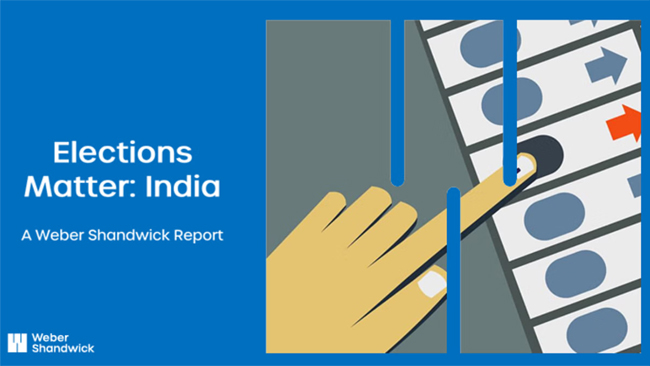
New Delhi,21 June, 2024.
Weber Shandwick India, today launched the “Elections Matter: India Report”.
The surveyled by the Corporate Advisory and Public Affairs practice, examined election
sentiments around news consumption habits, trust in different information
sources and voting behaviours and motivations among Gen Z (18-24 years) and
Millennial (25-44)consumers in India.
Key findings
A. Media consumption behaviour w.r.t. current events,
news & politics
·
Generational
differences in news consumption: Stark
contrast exists in news engagement between Millennials and Gen Zs. Over 55%
of Millennials followed news daily, compared to about 36% of Gen Z with males significantly
more inclined to current events, news & politics.While TV is among the top
3 news sources, there was a significantly lower preference among Gen Zs (44%)compared
to Millennials (60%).
·
Reaffirmation
of digital consumption surge:YouTube
is the leading platform for consumption of current events, news and politics,
in keeping with the digital media uptake.It was the dominant information
source across all demographics, particularly driven by Delhi, while TV channels
were on top in Chennai and Bangalore. It was followed closely by Instagram,
TV, and WhatsApp.
·
Most watched
is necessarily not the most trusted: Google
search, print media, and digital news media had a higher trust quotient
compared to most social media platforms.
·
Traditional
media resonating stronger for Millennials: Print media continued to have higheracceptance among Millennials. 45%
Millennials consumed print media for news and politics compared to only 31% Gen
Zs. This preference pattern was evident even in the consumption pattern for television.South
India especially Chennai and Bangalore had a stronger leaning to television
than the rest of India. Also, 42% males favouredprint versus 33% of women.Print
media was also high on trust compared to most social media platforms.
·
Concerns about
misinformation: After
fake news websites,social media influencers topped the list for spreading
misinformation. Males in particular were especially distrustful of them.
B.
Sentiments
towards elections & voting
·
Motivated Millennials
and less enthusiastic Gen Zs: Millennials
were significantly motivated by elections and voting due to a strong sense of
civic duty and the desire for educational reform. Chennai and Hyderabad had a
higher sentiment comparatively towards elections.
In contrast, Gen Z showed less
enthusiasm, hinting at a potential apathy in political engagement.
·
Priority
issues for elections and new government expectations:Civic and social factors
such as infrastructure development, outweighed economic concerns
and party manifesto promises as primary voting motivations across gender and
generational cohorts. The state of
the economy and education were the most pressing issues both for the current
elections and future government focus, reflecting widespread concerns about
socio-economic and educational development. This shift suggested a
future-oriented approach to polling, with voters seeking macro-level changes
for a better future.
·
Regional differences
in voting motivations: Voters in
Delhi focused on infrastructure development, while those in southern regions,
such as Chennai and Bangalore, prioritized voting for candidates who promised to
bring about change and impactful leadership.
·
Gender-specific
concerns towards elections:While economy,
education and public safety were perceived to be among the top priorities for the
recent elections, women were particularly interested in women empowerment
issues, highlighting the importance of gender-specific policy agendas.Also,
over 55% would like the new government to focus on economy, education and
healthcare agendas.
Commenting on the consumer survey findings,Rohan
Kanchan, MD – Consulting and Head of Public Affairs,Weber Shandwick India,said,
“This report underscores the dynamic nature of news consumption and
electoral engagement in today’s digital age. Even as broader generational
trends are known, nuances within the cohorts reveal a break from the pattern. For
instance, the connection of Influencers in consumer motivations vis-a-vis trust
in perception, might have implications in analyzing corporate reputation and
development of future strategies. Our national commonalities peppered with our
regional disparities, continue to provide an interesting lens to any consumer
study such as Elections Matter.”
The survey was conducted by YouGov among 1,000
respondents from the top 10 cities in India, including Mumbai, Delhi-NCR,
Chennai, Kolkata, Bangalore, Hyderabad, Pune, Lucknow, Jaipur, and Ahmedabad.
The demographics of the survey were balanced, with a near-equal split between
males (51%) and females (49%), and evenly distributed between Gen Zs and Millennials.